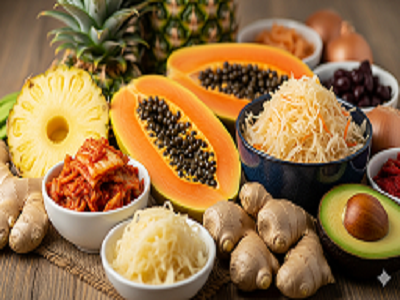
Let's face it. Our digestive system works tirelessly; it's an unsung hero. We often take it for granted. Yet, sometimes it needs a little extra help. For instance, we might reach for supplements or consider Digestive Health Enzymes in capsule form. But what if we could boost our digestion naturally? What if delicious food held the key? Indeed, nature provides an amazing bounty. In fact, many everyday foods are bursting with Digestive Health Enzymes. These vital proteins break down food. They unlock nutrients. They make absorption easier. Therefore, embracing a "food-first" approach is smart. It's also incredibly tasty. So, let's ditch the digestive distress. Let's embrace culinary delights. We can empower our gut. We can feel fantastic.
Why Do Digestive Health Enzymes Matter?
First, let's understand their role. Imagine a complex meal. It's a symphony of macronutrients. Proteins, fats, and carbohydrates arrive. Our body needs help. It must dismantle them. This is where enzymes shine. Amylase breaks down carbs. Lipase tackles fats. Protease handles proteins. Without them, food sits undigested. This leads to discomfort. Think bloating, gas, and indigestion. Chronic issues can arise. Nutrient deficiencies may develop. Therefore, adequate Digestive Health Enzymes are crucial. They ensure everything runs smoothly. They are the unsung heroes of our inner workings. While our pancreas produces many enzymes, external sources certainly help. This is especially true when we eat processed foods or when we age, as our natural enzyme production can decline. Therefore, incorporating enzyme-rich foods is incredibly beneficial. In fact, it's a proactive step that supports optimal gut health. Consequently, it promotes overall well-being. Furthermore, a diverse diet fuels our microbiome, and a healthy gut truly needs variety.Tropical Treasures: Pineapple and Papaya
Our journey begins in the tropics. These fruits are enzyme powerhouses. Pineapple: The Bromelain Champion Pineapple is more than just a sweet treat. In fact, it's rich in bromelain. This powerful enzyme is a protease; it breaks down proteins. What's more, bromelain also possesses anti-inflammatory properties, and consequently, it aids in muscle recovery. Therefore, many athletes enjoy pineapple, often consuming it after intense workouts. However, you should be sure to eat fresh pineapple, because cooked pineapple loses its enzyme potency. So, enjoy it raw, or alternatively, add it to smoothies. You could also make a vibrant fruit salad. It adds a zesty kick, and furthermore, it supports protein digestion. This makes it a great dessert, especially after a heavy meal. Beyond that, pineapple offers vitamin C, which boosts immunity. Truly, it's a win-win situation. Papaya: Home of Papain Another tropical star is papaya. It contains papain. Like bromelain, papain is a protease. It helps digest proteins. Papain is so effective. It's even used as a meat tenderizer. Imagine that power! Both unripe and ripe papaya contain papain. However, unripe papaya has more. Some people prefer the sweeter ripe version. Incorporate papaya into your diet. Add it to breakfast bowls. Enjoy it as a snack. Its subtle sweetness is delightful. It also provides vitamins A and C. These are powerful antioxidants. Regular consumption can ease indigestion. It may reduce bloating. Consider papaya a digestive ally.Fermented Wonders: Kimchi and Sauerkraut
Next, we venture into fermentation. These foods are alive. They contain beneficial bacteria. They also boost enzymes. Kimchi: The Spicy Gut Booster This Korean staple is a powerhouse. It's fermented cabbage. It includes various seasonings. Kimchi is rich in lactobacillus bacteria. This supports a healthy gut microbiome. The fermentation process creates enzymes. These aid digestion. They break down complex carbohydrates. The spicy kick also stimulates digestion. Kimchi is versatile. Add it to stir-fries. Serve it with eggs. Enjoy it as a side dish. It adds a unique flavor. It supports digestive health. Consider making your own. It's a rewarding process. However, store-bought is also fine. Just ensure it's unpasteurized. Sauerkraut: Simple Yet Mighty Sauerkraut is fermented cabbage. It's simpler than kimchi. Yet, it's equally effective. It's packed with probiotics. It also contains enzymes. These enzymes develop during fermentation. They help break down food. They improve nutrient absorption. Look for raw, unpasteurized sauerkraut. Pasteurization kills beneficial bacteria. It destroys valuable enzymes. Add sauerkraut to sandwiches. Serve it alongside sausages. It offers a tangy crunch. It supports digestive vitality. Start with small portions. Gradually increase intake. Your gut will thank you.Other Enzyme-Rich Foods to Explore
The list doesn't stop there. Many other foods offer enzymatic benefits. Avocado: The Lipase King Avocados are widely known for their healthy fats. However, they also contain lipase. This enzyme specifically digests fats. It helps break them down, and consequently, it makes fat absorption easier. Therefore, it can prevent feelings of heaviness. Enjoy avocado in salads, or make a creamy guacamole. You could also spread it on toast. It's incredibly versatile, and furthermore, it's packed with fiber. This fiber aids regularity, which further supports digestion. Thus, avocados are a true superfood. They offer many health benefits. Raw Honey: A Sweet Digestive Aid Raw honey is special. It contains enzymes. These include amylase and invertase. They help break down carbohydrates. They assist in sugar digestion. However, heating destroys these enzymes. Therefore, always choose raw honey. Add it to tea. Drizzle it over yogurt. Use it in salad dressings. It provides a natural sweetness. It also offers antibacterial properties. It's a delicious way to support your gut. However, consume in moderation. It is still sugar. Kiwi: A Small but Mighty Fruit Kiwi fruit contains actinidin. This enzyme helps digest proteins, and in fact, it's similar to papain and bromelain. Studies show it improves digestion, especially after protein-rich meals. Therefore, enjoy kiwi on its own, or alternatively, add it to fruit salads. Its vibrant green color is visually appealing. It's also rich in vitamin C, and consequently, this small fruit offers big benefits. What's more, it's very easy to incorporate into your daily routine. Ginger: More Than Just Spice Ginger is famous. It soothes upset stomachs. It contains zingibain. This protease helps digest proteins. Ginger also stimulates bile production. Bile aids fat digestion. Enjoy ginger tea. Add fresh ginger to stir-fries. Use it in marinades. Its warming spice is comforting. It's a natural digestive tonic. It's been used for centuries. Its benefits are well-known.Integrating Enzyme-Rich Foods into Your Diet
Making these changes is simple. Start small. Add one new food each week. Make a conscious effort. Focus on fresh, whole foods. Reduce processed items. Processed foods lack enzymes. They can strain your digestive system.- Start your day right: Add papaya or kiwi to your breakfast.
- Snack smartly: Grab a slice of fresh pineapple. Or some raw nuts.
- Lunchtime boost: Include avocado in your salad. Add some kimchi to your wrap.
- Dinner digestives: Serve sauerkraut with your meal. Enjoy a side of fresh ginger.
.png)
.png)



.png)
.png)
.png)